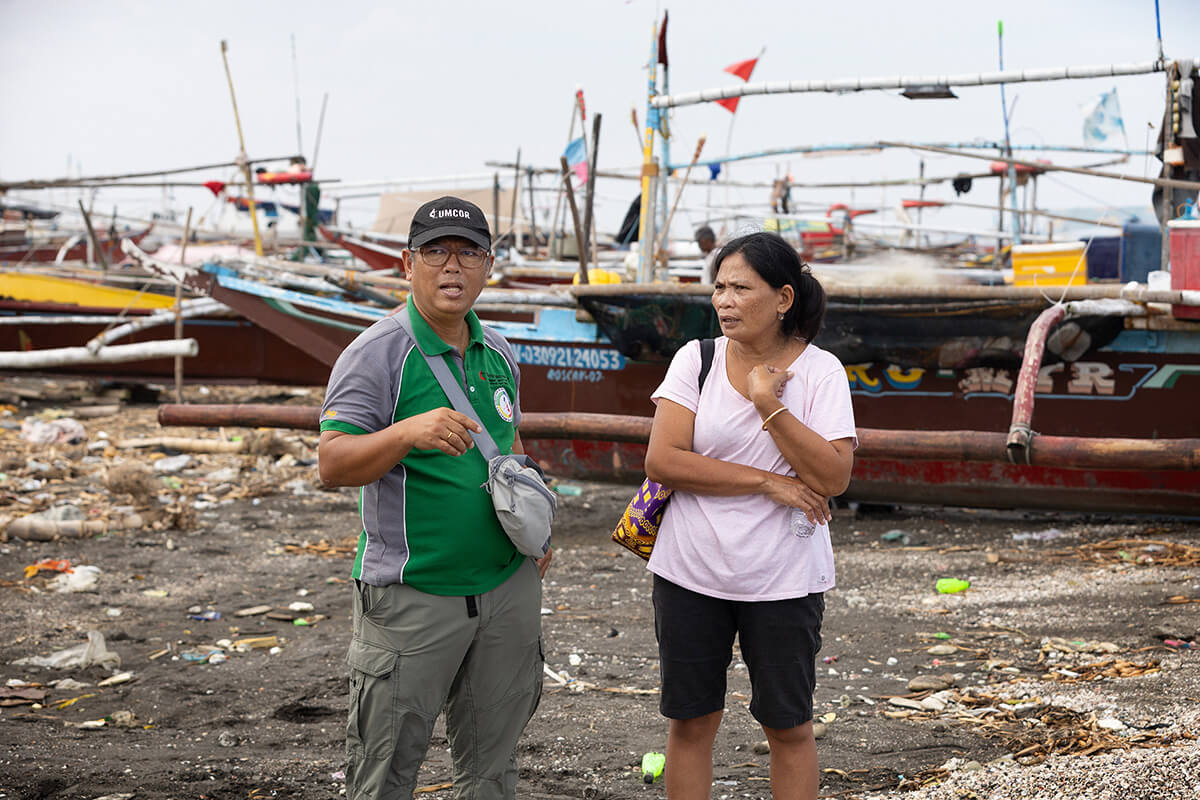Key points:
- After a typhoon and oil spill, church leaders joined with UMCOR and the local disaster response office to distribute rice.
- Manila Area Bishop Ruby-Nell M. Estrella highlighted the importance of sustainable practices and urged residents to protect the environment as part of their faith commitment.
- The Rev. Mario Ngittit, administrative pastor of Rosario United Methodist Church in Cavite, mentioned the impact of the oil spill response, emphasizing that it raises awareness about ocean protection and demonstrates that the church genuinely cares.
Fisherfolk and their families who depend heavily on the sea for their daily sustenance and livelihood are feeling the effects of climate change and natural and man-made disasters.
United Methodists are among those stepping in to offer relief and speaking out on the need for creation care.
The region was devasted by Typhoon Gaemi, named Carina in the Philippines, in July, which worsened monsoon rains in the Manila area, causing massive flooding and landslides.
An oil tanker carrying 370,000 gallons of oil sank in the waters of Bataan amid rough seas, affecting the coastal towns of Tanza and Rosario. Two other leaking vessels were later found in Bataan waters. Fishing was banned for weeks off the coast, disrupting the livelihoods of thousands in the province.
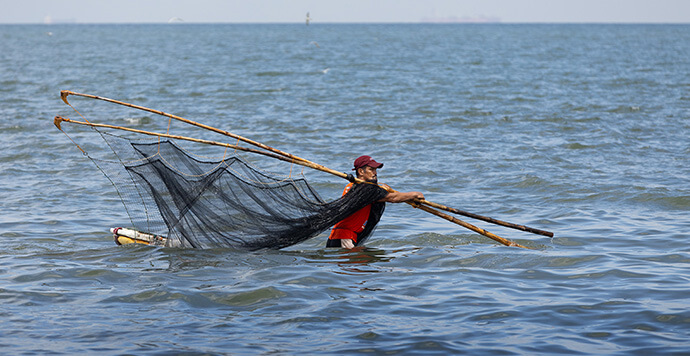
In addition to awarding solidarity grants for emergency relief in the region, the United Methodist Committee on Relief joined with the Manila Episcopal Area Disaster Management Office, the Philippines Central Conference Board of Church and Society and the Northeast Cavite District to distribute rice to affected families in the Cavite province.
Manila Area Bishop Ruby-Nell M. Estrella led the rice distribution on Oct. 15.
“We are here not just to give rice but to stand in solidarity with you,” Estrella said, citing Apostle Paul’s message about humanity’s role as caretakers of creation.
Estrella highlighted the importance of sustainable practices, urging residents to protect the environment as part of their faith commitment. She noted the toll environmental degradation and land reclamation projects have taken on the region’s ecosystem. Reclamation is the process of creating new land located near bodies of water. Some argue the projects are harmful to the environment, including exacerbating the vulnerability of coastal communities to natural disasters, flooding risks and pollution.
“God entrusted the whole of creation to humankind, but it has suffered because of greed and abuse,” Estrella said.
She called for compassion and solidarity, emphasizing the need for environmental responsibility and a focus on shared humanity.
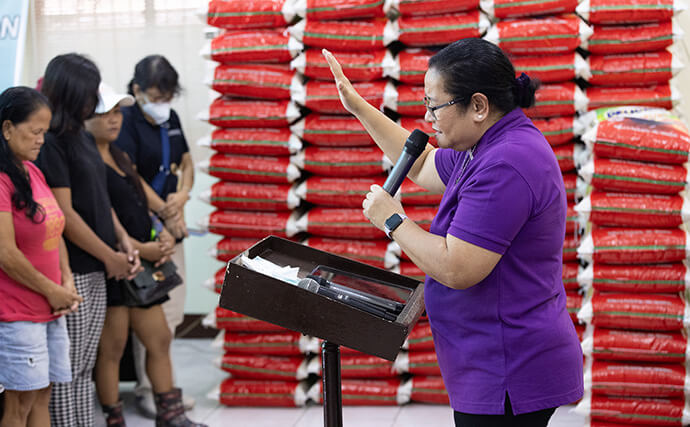
Romuel “Dojoe” Flores, a consultant with the United Methodist Committee on Relief’s International Disaster Response, urged the community to remain resilient.
“Climate change is affecting communities globally, not just the Philippines. We must build resilience to withstand life’s storms together,” he said.
The Rev. Glofie Baluntong, executive director of the Philippine Central Conference Board of Church and Society, emphasized the importance of partnership in providing disaster relief and advocacy for fisherfolk.
“Each of us has a role to play. We’re committed to sustaining this collaboration,” she said, noting that ongoing church support allows the community to continue its work despite hardships.
Josephine “Phine” Cedillo, coordinator for the episcopal area’s Disaster Management Office, emphasized UMCOR’s “Rice of Hope” campaign as a way to support vulnerable communities to “ensure that no one is left behind.”
Cedillo said that involving the affected beneficiaries in the relief distribution empowers them and fosters a sense of ownership and participation.
“It enhances their dignity and resilience beyond merely receiving aid; it strengthens community solidarity as they work together toward their recovery.”
Northeast Cavite District superintendent the Rev. Jong Tolentino said the event was a simple way for the church to show God’s care to those affected by the oil spill.
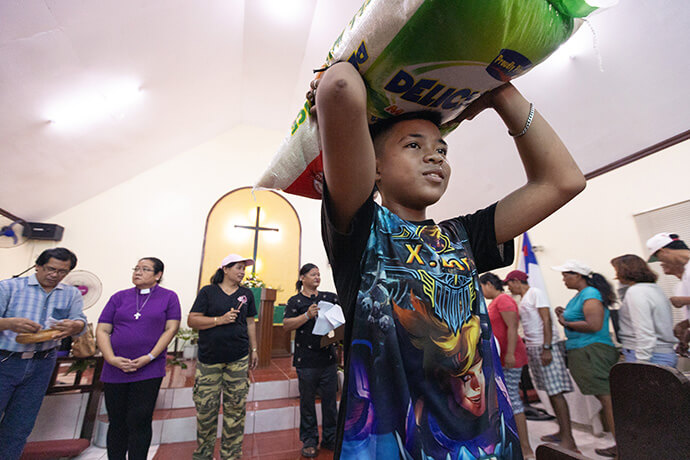
Voices from the community
For fisherman Richard Arcana, the event highlighted the power of community support.
“Flooding, trash and climate change have worsened things,” Arcana said, calling for unity amid these adversities.
How to help
The United Methodist Committee on Relief’s International Disaster Response and Recovery serves as the primary channel for United Methodist assistance for disasters that strike outside of the United States. Donate to https://umcmission.org/advance-project/982450/.
With a decade in fishing, July Aguilar lamented the oil spill’s effects on his livelihood.
“(There is) nothing left for us; we can’t fish and wait only for aid,” he said.
Armel Pangilinan voiced similar frustrations, stating the need for additional tools beyond rice to rebuild their fishing activities.
Likewise, Marietta Sapuna, a fish vendor, noted the oil spill’s disruption on her business, making it difficult to source products like daing (dried, preserved fish) and tinapa (smoked fish).
“We are grateful for this rice; it’s a beacon of hope,” she added.
Lyka Valderama, who comes from a fishing family, echoed the challenges. “Fishing is our tradition,” she said, “but now we question how to start again with everything lost.”
Long-term concerns
According to youth volunteer Rosell Lontoc, dredging activities further endanger local ecosystems and climate change. Dredging is the removal of sediments and debris from the bottom of lakes, rivers and other water bodies.
Lontoc highlighted that dredging has had lasting repercussions, including fish contamination.
“The reclamation project harms Cavite and other coastal regions,” she said. “The government and community must continue to support these fishermen.”
The Bureau of Fisheries and Aquatic Resources partially lifted the fishing ban put into effect after the oil spills, though with limitations due to ongoing environmental concerns, Lontoc said.
Subscribe to our
e-newsletter
During the rice distribution, United Methodist church leaders in the Philippines highlighted the importance of empowering fisherfolk and addressing their basic needs and sense of dignity.
The Rev. Marlon Diaz acknowledged the immediate relief from the “Rice of Hope” campaign, but emphasized the need for lasting empowerment.
“The experience of receiving ‘Rice of Hope’ brought the fishermen a sense of joy and inspiration to keep going,” he said. However, he reminded the community that while such aid offers temporary relief, the fisherfolk’s livelihood and identity are inherently tied to their ability to fish.
“Empowering them amid the oil spill crisis is vital,” he continued, “not only to relieve hunger but to restore their dignity, hope and identity as fishermen.”
Diaz likened The United Methodist Church to a vessel navigating the stormy seas of disunity and adversity, urging the church to remain steadfast in extending compassion and care to those who are “drowning in uncertainty.”
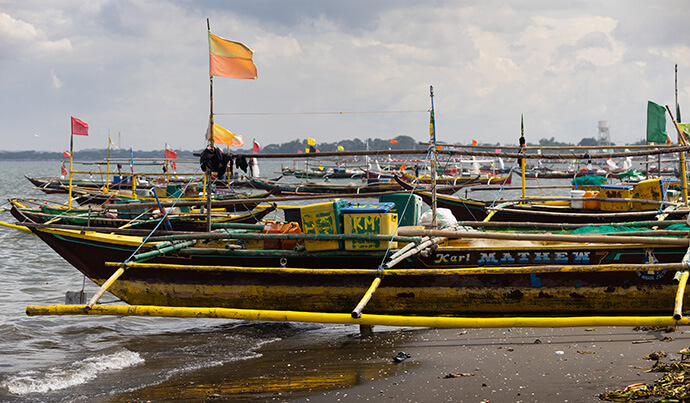
The Rev. Mario Ngittit, administrative pastor of Rosario United Methodist Church in Cavite, mentioned the impact of the oil spill response, emphasizing that it raises awareness about ocean protection and demonstrates that the church genuinely cares.
He urged the denomination to strengthen its focus on missions over politics and to meet the needs of struggling pastors.
Fisherman Ren Martinez described the dramatic environmental changes due to recent dredging and land reclamation projects.
“Where I used to set my nets is now too deep, and the land disturbed for ship channels is far from healed,” he said. Coastal flooding has now become a frequent concern, as nearby areas once teeming with fish are transformed into heavily reclaimed coastlines.
Tolentino said that empowering fisherfolk through organized responses to the oil spill has far-reaching effects. He said that strengthening local communities enhances their resilience against future environmental challenges.
United Methodist leaders expressed gratitude for the church’s commitment to holistic ministry and helping vulnerable populations impacted by natural disasters.
Tolentino commended the church for being a source of hope to those in need, while Ngittit urged the church to honor its Methodist mission, staying united, connectional and transparent in supporting those affected.
“Empowerment also equips the fishermen with knowledge and advocacy tools,” Tolentino said, “helping them to voice their rights and seek environmental policies that mitigate long-term damages.”
Mangiduyos is a communicator in the Philippines.
News media contact: Julie Dwyer at [email protected]. To read more United Methodist news, subscribe to the free Daily or Weekly digests.

